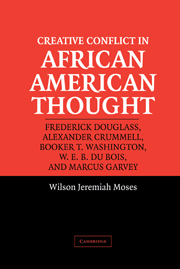Book contents
- Frontmatter
- Contents
- Acknowledgments
- Preface: Struggle, Challenge, and History
- 1 Introduction: Reality and Contradiction
- FREDERICK DOUGLASS: THE INDIVIDUALIST AS RACE MAN
- ALEXANDER CRUMMELL: THE ANGLOPHILE AS AFROCENTRIST
- BOOKER TALIAFERO WASHINGTON: THE IDEALIST AS MATERIALIST
- W. E. B. DU BOIS: THE DEMOCRAT AS AUTHORITARIAN
- 10 W. E. B. Du Bois on Religion and Art: Dynamic Contradictions and Multiple Consciousness
- 11 Angel of Light and Darkness: Du Bois and the Meaning of Democracy
- 12 Du Bois and Progressivism: The Anticapitalist as Elitist
- MARCUS MOZIAH GARVEY: THE REALIST AS ROMANTIC
- CONCLUSION: RESCUING HEROES FROM THEIR ADMIRERS
- Index
11 - Angel of Light and Darkness: Du Bois and the Meaning of Democracy
Published online by Cambridge University Press: 07 November 2009
- Frontmatter
- Contents
- Acknowledgments
- Preface: Struggle, Challenge, and History
- 1 Introduction: Reality and Contradiction
- FREDERICK DOUGLASS: THE INDIVIDUALIST AS RACE MAN
- ALEXANDER CRUMMELL: THE ANGLOPHILE AS AFROCENTRIST
- BOOKER TALIAFERO WASHINGTON: THE IDEALIST AS MATERIALIST
- W. E. B. DU BOIS: THE DEMOCRAT AS AUTHORITARIAN
- 10 W. E. B. Du Bois on Religion and Art: Dynamic Contradictions and Multiple Consciousness
- 11 Angel of Light and Darkness: Du Bois and the Meaning of Democracy
- 12 Du Bois and Progressivism: The Anticapitalist as Elitist
- MARCUS MOZIAH GARVEY: THE REALIST AS ROMANTIC
- CONCLUSION: RESCUING HEROES FROM THEIR ADMIRERS
- Index
Summary
William Edward Burghardt Du Bois in his prime could be an intimidating figure with his supercilious bearing, impeccable attire, carefully trimmed goatee, pince-nez, Phi Beta Kappa key, silver-engraved walking stick, imported cigarettes, and taste for Rhein wines. So matter-of-factly did he refer to his “days of rollicking boyhood” in the hills of New England that he successfully distracted readers from the fact that he was born in poverty, under the shadow of scandal in a strait-laced New England town. Mary Silvina Burghardt Du Bois was a single black woman, and, at the time of his birth, already the mother of five-year-old Adelbert, the result of an affair, perhaps with a coachman named James Craig, or perhaps, as she claimed, with a first cousin. Willie, as no one except Mary Church Terrell called him in adulthood, was the issue of her tenuous marriage to the Haitian-born Alfred Du Bois, a possible bigamist who disappeared from the lives of both his wives, and from the life of Willie, before the boy was old enough to know him.
No amount of writing on his early years is likely to obliterate the commonplace myth that Du Bois was a New England aristocrat, and this is unfortunate because the mythology that places him within a historical or geographical elite has led to egregious misinterpretations of his political philosophy. Du Bois's hostility to certain aspects of American democracy did not derive from aristocratic or upper-class bias, but from his fear of the racist majority.
- Type
- Chapter
- Information
- Creative Conflict in African American Thought , pp. 197 - 209Publisher: Cambridge University PressPrint publication year: 2004



